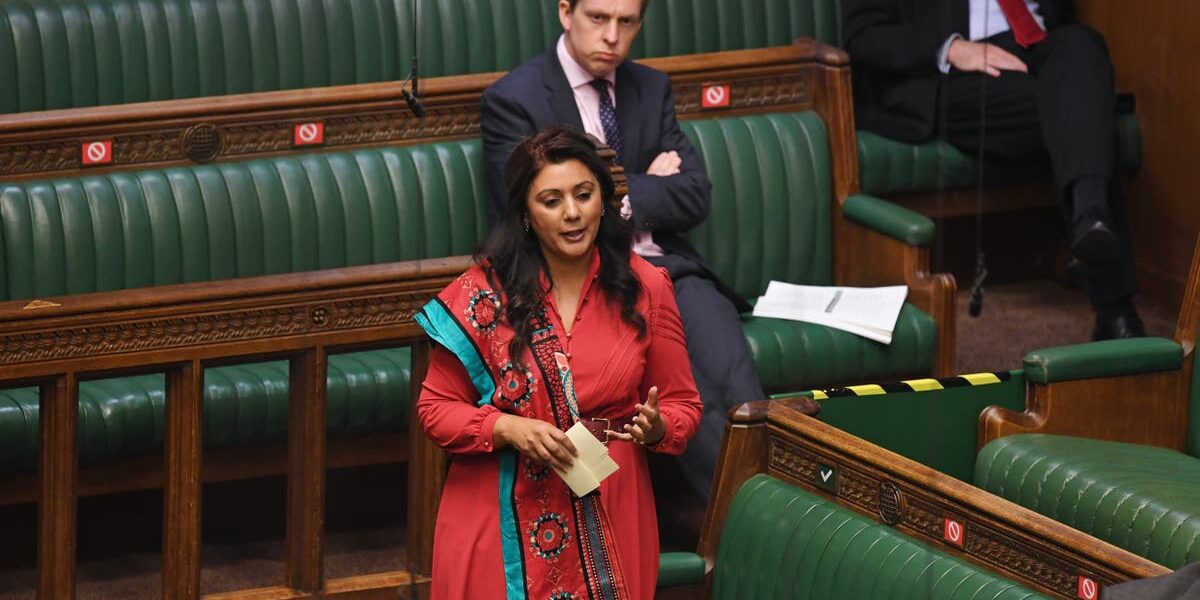Nusrat Ghani MP has alleged that she was sacked as a government transport minister in February 2020 because her Muslimness was making her colleagues uncomfortable. Ghani claims that concerns about the impact of her Muslimness were raised in relation to her perceived lacklustre defence of the Conversative Party against accusations of Islamophobia. In other words, she is suggesting her party wanted her to use her Muslim identity to defend them against the Islamophobia allegations (akin to a tactic often used by someone accused of racism but claiming that they are not because they have a black friend). Though the allegations are yet to be investigated, they are consistent with a string of accusations of racism and Islamophobia levelled at the Conservative Party which resulted in the government commissioning the Singh Review. Ghani’s claims should therefore not be dismissed but should be investigated fully with consequences for those found guilty.
Ghani’s claims of Islamophobic treatment, however, don’t sit well with her own politics that buttress racist and Islamophobic rhetoric, policies, and practices. First, her voting record shows that as a Brexiteer she has regularly voted for a stricter asylum system, stronger enforcement of immigration rules (which includes the ‘hostile environment’ policy), and for the incoming Nationality and Borders Bill (which will enable the government to remove British citizenship without prior warning). She has also regularly voted for military action in Syria and Iraq, mass surveillance of people’s communications and activities (of which the mass surveillance of Muslim communities in the Prevent programme is an important component), and voted against investigations into the Iraq War, and laws to promote equality and human rights. Second, she has publicly stated her support for the Prevent counter-terrorism strategy which is widely considered to be toxic and Islamophobic. As well as writing for the right wing think the Policy Exchange (as a Senior Fellow) that ‘Prevent matters’, that it needs to ‘re-focus on ideology’, and that ‘Prevent has been a successful endeavour thus far’, in November 2020 at the House of Commons, she also asked the Prime Minister, ‘Does he agree that here in the UK we must redouble our support for anti-extremism programmes such as Prevent’. In the same article for Policy Exchange, she wrote in support of the government commissioned review of the Prevent Strategy, led by William Shawcross. Whilst more than 550 Muslim organisations, academics, scholars, and community organisers from across Britain pledged to boycott the review because of its narrow terms of reference and the appointment of Shawcross (who has his own chequered past of making Islamophobic remarks), Ghani lauded his appointment because of his ‘robust’ work as Chair of the Charity Commission (in his first two years in post a quarter of the inquiries launched by the Commission targeted Muslim groups). Third, in a 2016 interview with the right-wing tabloid the Evening News, she regurgitated numerous tired racialised cliches about Muslim men and Islamic head scarves.
Given her political positions, it was not that surprising to read in her 2018 interview with Politics Home that she didn’t recognise, and downplayed claims, of Islamophobia in the Conservative Party (just some people saying stupid things as opposed to a widespread problem as Baroness Warsi claimed). The Muslim Council of Britain wrote to the party Chairman in 2018, Brandon Lewis, to request an inquiry into the claims of Islamophobia in the party. Ghani felt an Islamophobia investigation wasn’t necessary because ‘it’s not the experience I have’.
Enabling Islamophobia and Anti-Muslim Policies
What we see in Ghani’s case is a politician who had no qualms about downplaying accusations of racism and Islamophobia made by others about her party, regurgitating racialised Islamophobic narratives about Muslims, and actively strengthening and reinforcing racist and Islamophobic counterterrorism and immigration policies and practices with her vote in Parliament, all to further her political career. Her voting power and patterns further institutionalised racism and Islamophobia, contributed to the demonisation of whole Muslim communities, constructed them as suspects, and further enabled infrastructures of surveillance and control to surround them. Her mistake was in thinking, as with O.J. Simpson and his sentiment ‘I’m not Black, I’m O.J.,’ that she was somehow able to transcend her Muslimness in the eyes of the government because of her proximity to power. Despite the widespread evidence of racism and Islamophobia in her own party, and evidence of racism and Islamophobia in counterterrorism and immigration policies and practices, Ghani was motivated to speak out about Islamophobia only when it impacted her own career. She happily and actively fed the machine whilst it was targeting others but became upset and dismayed when the same machine targeted her. She confidently denied, dismissed, and downplayed the racism and Islamophobia of the Conservative Party and government which then attacked her.
Ghani’s tendency to view and recognise racism as an individualised phenomenon detached from broader structural social formations is a legacy of post-racial illusions that cleansed mainstream society of racism and relegated it to the margins. Indeed, the Conservative Party often points to its ethnic minority front benchers to buttress its anti-racist credentials and dismiss claims about its racism and that of its policies. Rationalised as an exceptional individual problem of bigotry and hate on the margins of society, racism was subsumed into the hate crime agenda as one of many ‘hatreds’ in society which the state would police as a neutral arbiter to ensure public order, and much of anti-racism was diluted to simply recognise ‘unconscious’ bias. By refocussing the site of racism from the socio-political to the individual the hate crime agenda has not only absolved the state whilst it rampantly institutionalises racism (with newer immigration and counterterrorism legislation), but it also ignores the mundane nature of everyday racism that doesn’t satisfy legal assumptions that characterise racism as an extreme irrational aberration from the norm.
Therefore, part of the difficulty faced by Ghani in making these claims, apart from the fact that she has in the past dismissed the structural dimension of racism because it didn’t reflect her own personal experience, is that, as Crenshaw argued almost 30 years ago, anti-racism is only tolerated to the extent that it poses no serious threat to social order and power. It is for that reason that the 2021 Singh Review found no evidence of structural Islamophobia and racism in the Conservative Party but only attitudinal problems at an individual level. Similarly, the 2021 Sewell report produced by the Commission on Race and Ethnic Disparities following the Black Lives Matter protests in the UK only found anecdotal evidence of racism and no evidence of institutional racism in the UK. And so, Ghani should not wait with bated breath for a satisfactory resolution of her complaint.
Dr Fahid Qurashi Is a Research Director at the Ayaan Institute



Leave a Reply